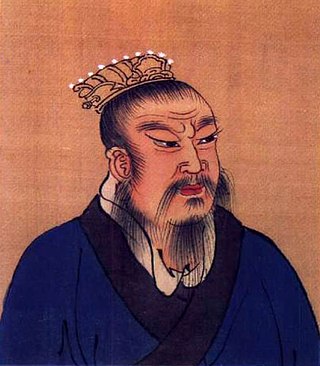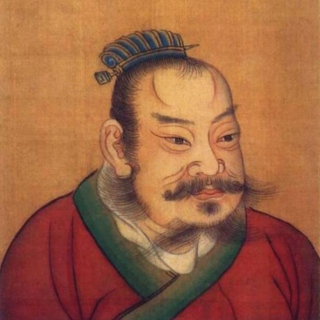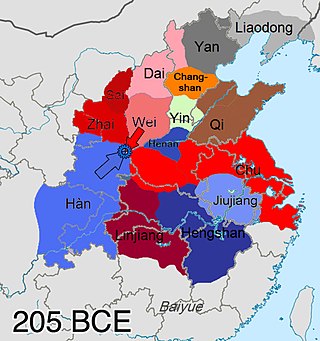Related Research Articles

This article concerns the 200 BC decade,that lasted from 209 BC to 200 BC.
Year 204 BC was a year of the pre-Julian Roman calendar. At the time it was known as the Year of the Consulship of Cethegus and Tuditanus. The denomination 204 BC for this year has been used since the early medieval period,when the Anno Domini calendar era became the prevalent method in Europe for naming years.
Year 205 BC was a year of the pre-Julian Roman calendar. At the time it was known as the Year of the Consulship of Scipio and Dives. The denomination 205 BC for this year has been used since the early medieval period,when the Anno Domini calendar era became the prevalent method in Europe for naming years.
LüZhi,courtesy name E'xu (娥姁) and commonly known as Empress Lü and formally Empress Gao of Han,was the empress consort of Gaozu,the founding emperor of the Han dynasty. They had two known children,Liu Ying and Princess Yuan of Lu. Lüwas the first woman to assume the title Empress of China and paramount power. After Gaozu's death,she was honoured as empress dowager and regent during the short reigns of Emperor Hui and his successors Emperor Qianshao of Han and Liu Hong.

Emperor Gaozu of Han,given name Liu Bang (劉邦),born Liu Ji (劉季),was the founder and first emperor of the Han dynasty,reigning from 202 to 195 BC. His temple name was "Taizu" while his posthumous name was Emperor Gao,or Gaodi;"Gaozu of Han",derived from the Records of the Grand Historian,is the common way of referring to this sovereign even though he was not accorded the temple name Gaozu.

Zhang Liang,courtesy name Zifang,was a Chinese military strategist and politician who lived in the early Western Han dynasty. He is also known as one of the "Three Heroes of the early Han dynasty" (漢初三傑),along with Han Xin (韓信) and Xiao He. Zhang Liang contributed greatly to the establishment of the Han dynasty. After his death,he was honoured with the posthumous title "Marquis Wencheng" by Emperor Qianshao. Zhang Liang is depicted in the Wu Shuang Pu by Jin Guliang.

The Chu–Han Contention (楚漢相爭),also known as the Chu–Han War (楚漢戰爭),was an interregnum period in ancient China between the fall of the Qin dynasty and the establishment of the Han dynasty. After the third and last Qin ruler,Ziying,unconditionally surrendered to rebel forces in 206 BCE,the former Qin Empire was divided by rebel leader Xiang Yu into the Eighteen Kingdoms,which were ruled by various rebel leaders and surrendered Qin generals. A civil war soon broke out,most prominently between two major contending powers –Xiang Yu's Western Chu and Liu Bang's Han. Some of the other kingdoms also waged war among themselves but these were largely insignificant compared to the main conflict between Chu and Han. The war ended in 202 BCE with a Han victory at the Battle of Gaixia,during which Xiang Yu committed suicide after making a last stand. Liu Bang subsequently proclaimed himself emperor and established the Han dynasty as the ruling dynasty of China.

Xiang Yu,born Xiang Ji,was the Hegemon-King of Western Chu during the Chu–Han Contention period of China. A noble of the Chu state,Xiang Yu rebelled against the Qin dynasty,destroying their last remnants and becoming a powerful warlord. He was granted the title of "Duke of Lu" (魯公) by King Huai II of the restoring Chu state in 208 BC. The following year,he led the Chu forces to victory at the Battle of Julu against the Qin armies led by Zhang Han. After the fall of Qin,Xiang Yu was enthroned as the "Hegemon-King of Western Chu" (西楚霸王) and ruled a vast area covering modern-day central and eastern China,with Pengcheng as his capital. He engaged Liu Bang,the founding emperor of the Han dynasty,in a long struggle for power,known as the Chu–Han Contention,which concluded with his eventual defeat at the Battle of Gaixia and his suicide. Xiang Yu is depicted in the Wu Shuang Pu by Jin Guliang.
Emperor Yi of Chu,also known as King Huai II of Chu before receiving his de jure emperor title,personal name Xiong Xin,was the ruler of the revived Chu state in the late Qin dynasty. He was a grandson of King Huai of Chu. In 223 BC,during the Warring States period,the Chu state was conquered by the Qin state,which unified the various Chinese feudal states in a series of wars and established the Qin dynasty in 221 BC. In 209 BC,when rebellions broke out throughout China to overthrow the Qin dynasty,the Chu state was revived as an insurgent state against Qin imperial rule. Xiong Xin was discovered by Xiang Liang,a rebel leader who descended from a famous Chu general,Xiang Yan,and installed on the Chu throne as "King Huai II of Chu". However,Xiong Xin was a puppet ruler because power was concentrated in Xiang Liang's hands,and while he was able to assert his power after Xiang Liang was killed in battle,eventually Xiang Liang's nephew,Xiang Yu,would concentrate power in his own hands through a coup against King Huai II's general Song Yi during the Battle of Julu. In 206 BC,the Qin dynasty was overthrown by the rebels,after which Xiang Yu,who was the de facto leader of all the rebel forces,divided the former Qin Empire into the Eighteen Kingdoms. He promoted King Huai II to a more "honourable" title –Emperor Yi of Chu –and made him the nominal sovereign ruler over all the Eighteen Kingdoms. Xiang Yu then had Emperor Yi relocated to Chen County and secretly ordered Ying Bu to assassinate the emperor during the journey.

The Three Qins refer to three of the Eighteen Kingdoms,the short-lived power-sharing arrangement formed in 206 BC after the collapse of the Qin Dynasty. The three kingdoms were located in Guanzhong Plain,the heartland of the Qin Empire.
The Battle of Jingxing (井陘之戰),also known as the Battle of Tao River (洮水之戰),was fought in October 205 BC between the army of Han,commanded by Han Xin,and a Zhao army. The Zhao were led by Prince Zhao Xie (趙歇) of Zhao and Chen Yu (陳餘),also known as the Lord of Cheng An (成安君),who was serving as Zhao Xie's prime minister.
The Battle of Wei River was fought in November 204 BC between the Han and a combined force of Qi and Western Chu. The famous General Han Xin led the Han force,while the Chu were led by Long Ju (龍且) and the Qi by King Tian Guang (田廣). The result ended with Han Xin conquering the Qi kingdom.
Xin,King of Hán,also known as Hán Xin and as Hán Wang Xin,was a descendant of the royal family of the state of Hán during the Warring States period of China. After the establishment of the Han dynasty,Emperor Gaozu granted Hán Xin the title of "King of Hán" (韓王). In 201 BC,Hán Xin was suspected of conspiring with the Xiongnu to attack the Han Empire and decided to defect to the Xiongnu. He was killed in action during a battle against the Han army in 196 BC.
The Battle of Gaixia was a last stand fought in December 203 BC during the Chu–Han Contention between the forces of Liu Bang and Xiang Yu. The battle concluded with victory for Liu Bang,who proclaimed himself Emperor and founded the Han dynasty. This is the last major battle of the Chu-Han Contention,ending with the suicide of Xiang Yu and the undisputed rule of Liu Bang.

Cao Shen or Cao Can,courtesy name Jingbo,was a Chinese politician. He served as a chancellor of the Western Han dynasty. He participated in the Chu–Han Contention on Liu Bang 's side and contributed greatly to the founding of the Han dynasty.
Long Qie was a military general who served under the warlord Xiang Yu during the Chu–Han Contention.
Dong Yi was a military general of the Qin dynasty. He surrendered to Xiang Yu after the Battle of Julu in 207 BC. In 206 BC,following the collapse of the Qin dynasty,he was conferred the title of "King of Di" (翟王) by Xiang Yu and given part of the lands in Guanzhong as his fief when the latter split the former Qin Empire into the Eighteen Kingdoms.
Ying Bu was a Chinese military general,monarch,politician,and warlord who lived during the early Han dynasty. He was a native of Lu County. In his early life under the Qin dynasty,Ying Bu was convicted and sentenced to qing,so he was also called Qing Bu (黥布). He was then sent to Mount Li to perform hard labour by constructing Qin Shi Huang's mausoleum. He later escaped with some men and became the leader of a bandit gang. Ying Bu participated in the insurrection against the Qin dynasty after the Dazexiang Uprising broke out in 209 BC. After the uprising failed,he became part of a rebel force led by Xiang Liang. He assisted Xiang Liang's nephew and successor Xiang Yu in overthrowing the Qin dynasty. After the fall of Qin,he initially fought on Xiang Yu's side in the Chu–Han Contention,a power struggle for supremacy over China between Xiang Yu and Liu Bang. However,later,he defected to Liu Bang's side and helped Liu defeat Xiang Yu and become the emperor. During this period of time,Ying Bu held the title "King of Jiujiang". In c.August 203,Liu Bang appointed Ying Bu as a vassal king and granted him the title "King of Huainan". In 196 BC,Ying Bu rebelled against the Han dynasty but was defeated and killed.
Wei Bao was the ruler of the Kingdom of Western Wei (西魏國) of the Eighteen Kingdoms during the Chu–Han Contention,an interregnum between the Qin and Han dynasties of China.

The Battle of Anyi (安邑之戰) was a battle fought between the Kingdom of Han and the Kingdom of Wei fought in August 205 BC during the Chu-Han Contention. It suppressed Wei Bao's rebellion and paved the way for the invasion of the Kingdom of Dai,and ultimately,the Battle of Jingxing.
References
- ↑ Hung, Hing Ming (2011). The Road to the Throne: How Liu Bang Founded China's Han Dynasty. Algora. pp. 106, 111. ISBN 978-0875868387.
- ↑ Hung, Hing Ming (2011). The Road to the Throne: How Liu Bang Founded China's Han Dynasty. Algora. pp. 107–110. ISBN 978-0875868387.
- ↑ Hung, Hing Ming (2011). The Road to the Throne: How Liu Bang Founded China's Han Dynasty. Algora. pp. 85, 87–88, 105. ISBN 978-0875868387.
- ↑ Hung, Hing Ming (2011). The Road to the Throne: How Liu Bang Founded China's Han Dynasty. Algora. pp. 109–110. ISBN 978-0875868387.
- ↑ Hung, Hing Ming (2011). The Road to the Throne: How Liu Bang Founded China's Han Dynasty. Algora. p. 110. ISBN 978-0875868387.
- ↑ Hung, Hing Ming (2011). The Road to the Throne: How Liu Bang Founded China's Han Dynasty. Algora. p. 109. ISBN 978-0875868387.
- ↑ Hung, Hing Ming (2011). The Road to the Throne: How Liu Bang Founded China's Han Dynasty. Algora. pp. 111–112. ISBN 978-0875868387.
- ↑ Qian, Sima. Records of the Grand Historian, Sections: Emperor Gaozu of Han, Xiang Yu.
- ↑ Hung, Hing Ming (2011). The Road to the Throne: How Liu Bang Founded China's Han Dynasty. Algora. pp. 112–113. ISBN 978-0875868387.
- ↑ Qian, Sima. Records of the Grand Historian, Sections: Emperor Gaozu of Han, Xiang Yu.
- ↑ Qian, Sima. Records of the Grand Historian, Section: Emperor Gaozu of Han.
- ↑ Qian, Sima. Records of the Grand Historian, Sections: Emperor Gaozu of Han, Xiang Yu, Zhang Er & Chen Yu, Wei Bao.
- ↑ Qian, Sima. Records of the Grand Historian, Sections: Emperor Gaozu of Han, Xiang Yu, The Marquis of Huaiyin.
- ↑ Hung, Hing Ming (2011). The Road to the Throne: How Liu Bang Founded China's Han Dynasty. Algora. p. 116. ISBN 978-0875868387.
- ↑ Qian, Sima. Records of the Grand Historian, Sections: Emperor Gaozu of Han, Xiang Yu.
- ↑ Hung, Hing Ming (2011). The Road to the Throne: How Liu Bang Founded China's Han Dynasty. Algora. pp. 115–116, 130–131. ISBN 978-0875868387.
- ↑ Qian, Sima. Records of the Grand Historian, Sections: Cao Shen, Fan Kuai, Guan Ying, Jin Xi.
- ↑ Qian, Sima. Records of the Grand Historian, Sections: Emperor Gaozu of Han, Guan Ying.
- ↑ Hung, Hing Ming (2011). The Road to the Throne: How Liu Bang Founded China's Han Dynasty. pp. 135–136, 138–139, 144. ISBN 978-0875868387.
- ↑ Qian, Sima. Records of the Grand Historian, Sections: Emperor Gaozu of Han, Xiang Yu.
- ↑ Hung, Hing Ming (2011). The Road to the Throne: How Liu Bang Founded China's Han Dynasty. pp. 118–119, 120–121. ISBN 978-0875868387.
- ↑ Qian, Sima. Records of the Grand Historian, Sections: The Marquis of Huaiyin, Wei Bao.